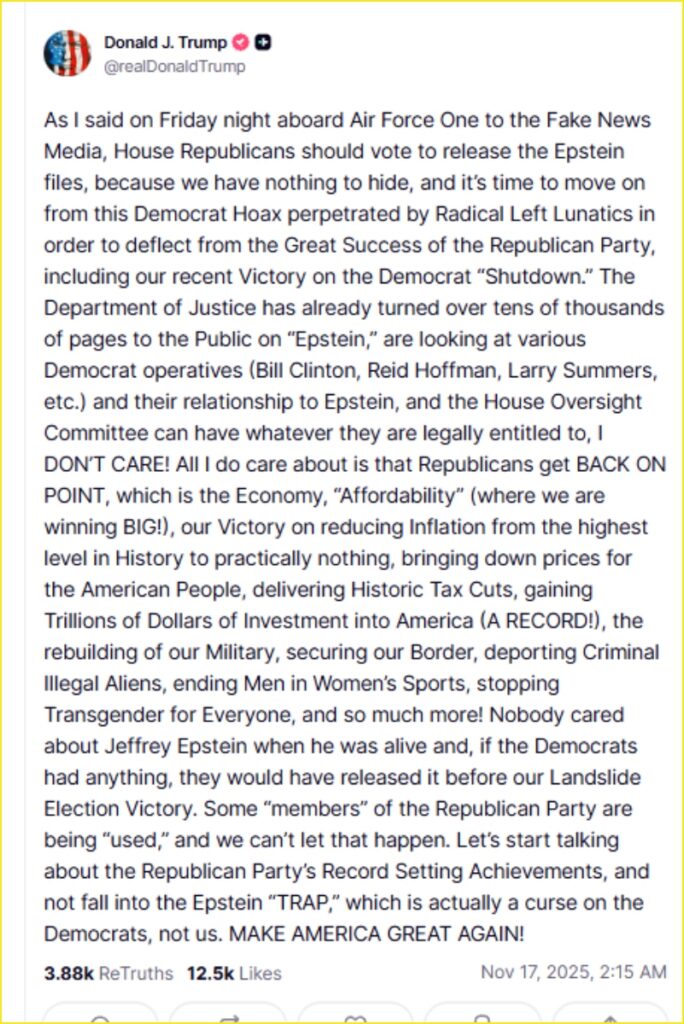President Donald Trump is pressing House Republicans to approve a bill forcing the release of all government-held documents related to Jeffrey Epstein, a striking reversal from his previous reluctance to engage with the subject and a move that has intensified divisions inside the GOP.
In a Truth Social post late Sunday, November 16, 2025, Trump urged Republicans to “vote yes” on the Epstein Files Transparency Act, insisting, “We have nothing to hide.” He accused Democrats of selectively releasing documents to push a “fake narrative” linking him to the disgraced financier.
His push comes after House Democrats published a tranche of previously unseen emails between Epstein and Ghislaine Maxwell, who is serving a 20-year federal sentence for sex trafficking.
One email referenced Trump, though the White House said there is no evidence of wrongdoing.

Momentum Builds for the Epstein Files Transparency Act
The bipartisan measure—designed to compel the Justice Department to release all unclassified documents connected to Epstein’s crimes and past investigations—has been gaining traction. Nearly 100 House Republicans are expected to break ranks and support the bill, signaling the strongest congressional appetite yet for full disclosure.
The House is expected to vote this week. The bill’s fate in the Senate, however, is less certain. If it clears both chambers, Trump would be required to sign it into law.
Speaker Mike Johnson has framed the vote as an opportunity to dispel lingering allegations about Trump’s past social ties to Epstein. Though the two appeared in photos at social events years ago, Trump has long maintained he severed all relations with Epstein before his 2008 conviction, claiming he had “no idea” about his criminal behavior.
A Public Rift with Marjorie Taylor Greene
Trump’s pivot has triggered a public rupture with one of his staunchest allies, Rep. Marjorie Taylor Greene.
The president publicly branded her “wacky” and a “traitor,” accusing her of undermining the party as it approaches a crucial vote. Greene, in turn, accused Trump of abandoning “America First” principles and bullying Republicans into supporting legislation she claims could backfire politically.
Their feud reflects broader unease within a GOP increasingly split between hardline loyalists and members seeking distance from political crossfire.
Survivors Demand Release of Files
In a rare joint letter, Epstein survivors and the family of Virginia Giuffre called on lawmakers to back the bill, arguing that transparency is essential for accountability.
They urged Congress to consider “how they would respond if their own daughters were in our place,” a message that has resonated across both parties as debate intensifies.
Justice Department Signals Expanded Review
The Justice Department has confirmed it will review Epstein’s connections to high-profile political and financial figures, including former President Bill Clinton, LinkedIn co-founder Reid Hoffman, and former Treasury Secretary Larry Summers. All have denied knowledge of Epstein’s criminal activity.
Meanwhile, House Republicans recently released an additional 20,000 documents, accusing Democrats of “cherry-picking” earlier disclosures to smear Trump.
Trump’s embrace of full disclosure—after years of distancing himself from the topic—reflects both political calculation and mounting pressure within Congress to confront the unresolved questions surrounding Epstein’s network.
With both parties now publicly committed to transparency, the coming days may finally determine whether the long-withheld archive of Epstein-related records will be released—documents that could reshape public understanding of one of the most far-reaching criminal scandals in modern U.S. history.

